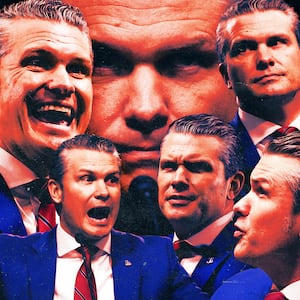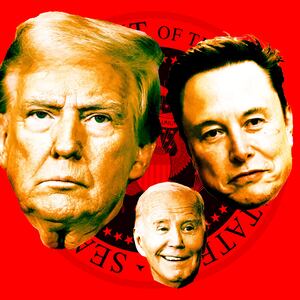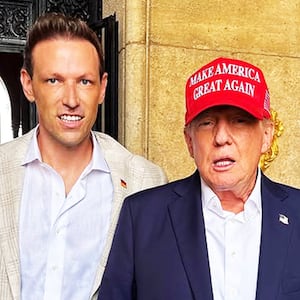Secretary of Defense Pete Hegseth had better hope the Pentagon mess installs a mimosa bar in his new office or the mornings are going to be very hard to handle. He, like Secretary of State Marco Rubio, is going to be dealing with a perfect storm of international headaches and constraints on his authority that will require a considerable quantity of fortitude—or failing that, liquid courage—in the months ahead. (Except, wait, Hegseth had reportedly promised Senators he’d remain tee-total on the job.)
There are two primary reasons for this. First, most of the big national security and foreign policy decisions the new administration makes will be made in the White House—and in many cases, by President Trump himself. Next, and more importantly, Trump’s new administration is in the midst of undertaking the greatest round of unilateral disarmament in recent history. While our adversaries may be celebrating, the leaders tasked now with managing our international policy apparatus are going to struggle with having less influence and fewer tools than any of their recent predecessors.
While Rubio is widely regarded as well-qualified for his role at Foggy Bottom, his status as a former rival (and Trump’s general distrust of bureaucracies like that at the State Department) has always foreshadowed a marginal role. Hegseth is certainly not as qualified, and that should have been a clue as to what Trump wanted—an easily managed seat-filler who would not challenge the real power players. The Commander-in-Chief will be calling the shots and probably has imagined the former Fox anchor as the highest-ranking press secretary in Pentagon history.
Rubio will attend many funerals and international summits. For all of his talk of bringing a “warrior mentality” back to what is indisputably the world’s most lethal, potent, warrior-laden military force, Hegseth will lead the charge on culture war issues like DEI. Trump (with the assistance of Mike Waltz at the NSC and a mixed bag of special envoys who have been appointed to serve alongside our ambassadors, thus supplanting their roles) will handle the heavy lifting. And the medium lifting. The high-level diplomacy, and the medium-level diplomacy. And what our most recent non-Trump GOP president would have called the “strategery.”
The result will be the classic Washington problem often faced by officials in dysfunctional governments: having all the responsibilities that go with a job but not the authority needed to handle them. It’s a scenario almost certainly being greeted with cheers by America’s rivals like China and Russia.
In just the past week, we have already seen an extraordinary range of actions by the new administration that will very nearly empty what former Secretary of Defense Madeleine Albright used to call “the foreign policy toolbox.” Systematically and yet without much thought given to consequences, vital diplomatic and national security tools are being stripped away from our national security leadership.
Foreign aid has been stopped and key programs have been targeted for shut down, despite the vital leverage they give us worldwide. Our most important alliances are in turmoil as the administration has targeted friends worldwide. In the case of Canada, Panama and Denmark, the sovereign entity that has controlled Greenland for eight centuries, these threats have included coercion and use of force to support the administration’s revival of a golden foreign policy oldie, “territorial expansion.” Make no mistake, threatening these nations and other partners with tariffs and trade wars is not going to improve relationships and may push some of them to the point of active tensions.
Abandoning, as seems likely, plans created and supported by allies, like the defense of Ukraine, won’t help; nor will the direct meddling of top officials of the administration in the politics of our European allies. By this, of course, I refer to the active support of the new president’s most influential advisor, Elon Musk, for far-right groups in the UK and Germany. (The broader GOP, meanwhile, seems infatuated with Hungary’s leader Viktor Orban, whose leadership is an active impediment to European unity, an important factor in the strength of our most important alliance.)
And of course, tariffs will produce not only tensions but will push up not only the price of eggs but items on which virtually all consumers and businesses depend, likely leading to rising interest rates and a slowing economy. The picture grows darker still if the primary economic goal of the administration is, as expected, lowering taxes for the richest Americans, a move which will almost certainly raise our deficit, compound our debt burden and very likely damage major segments of public and social cohesion.
Back during the early days of the Cold War, foreign policy guru George Kennan wrote a famous advisory cable warning of the Soviet threat, concluding with the reminder that the best way to beat our rival began at home. He meant not only cultivating economic strength but offering to the world the example of a thriving democratic society. Assaults on the rule of law and the administration’s desire to cut references to democratic values from our foreign policy messaging will fritter away this additional source of “soft power.”
None of these steps will make the jobs of Hegseth or Rubio any easier. And again, we’re only a week in. More damage can certainly be done. Now, it’s fair to ask whether Trump and his White House team be able to manage some international situations effectively, even in some cases more effectively than did Biden? It certainly is. Indeed, experts in both parties expect it.
So Hegseth should not start popping a bottle of bubbles with his morning intelligence briefing quite yet. But he—and Rubio and the rest of us—should be aware of the hidden but significant national security costs of some of the first initiatives undertaken by their colleagues who are in charge in the nation’s capital. If they take their oaths of office seriously, they should push back on them and advise a course reversal before the damage done is too great.








